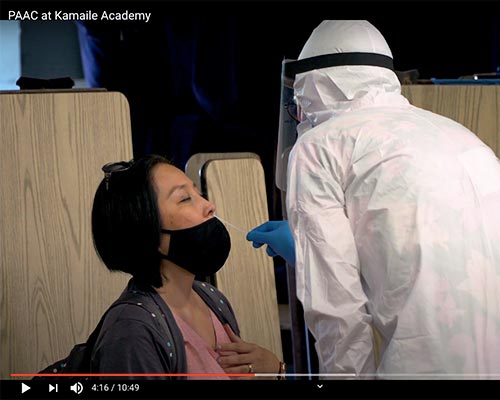Economics Professor Ruben Juarez considers himself an optimist. But, in spring 2021, when he first began driving from the UH Mānoa campus to an elementary school in Waiʻanae to launch a pilot COVID-19 testing and education program, even Juarez did not anticipate the spectacularly successful results.
Approximately 80% of the 120 teachers and staff at Kamaile Academy (Pre–12) volunteered to take free rapid antigen testing from March to May 2021. The participating workers underwent nasal swab tests — many of them swabbing their own noses — with the majority being tested more than once, some on a weekly basis. The results?
- About 87% of participants reported their participation led to a better understanding of the need for antigen testing.
- 52% were more likely to be vaccinated as a result of the pilot testing and education program.
Those findings were so remarkable that the National Institutes of Health (NIH) awarded nearly $3 million to the Pacific Alliance Against COVID-19 pilot project led by the College of Social Sciences, John A. Burns School of Medicine and the Accountable Healthcare Alliance of Rural Oʻahu.
“The results were excellent and truly reflected the team’s rapport with Kamaile Academy participants,” said project co-lead Juarez, a research fellow with the UH Economic Research Organization in CSS. “This was important given the disproportionate adverse impacts of COVID-19 on Native Hawaiian and Pacific Islander communities coupled with pervasive vaccine hesitancy.”
Added CSS Dean Denise Eby Konan, “We are so proud of this pilot project, whose primary goal is safer school reopenings, especially in underserved communities with higher health disparities. This multidisciplinary approach empowers UH to work with our health-focused partners, and recognizes how teachers and staff can be among the brightest warriors in the front-line fight against COVID-19.”
Free antigen testing of teachers and staff is expected to expand to schools in Waiʻanae and Waimānalo on Oʻahu, Hāmākua-Kohala and Hilo on Hawaiʻi Island, and on Molokaʻi.
UH Mānoa is one of 15 institutions to receive a NIH award through the RADx-Underserved Populations Safe Return to School Diagnostic Testing initiative, a part of the Rapid Acceleration of Diagnostics initiative.
